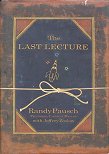When Randy Pausch, a computer science professor at Carnegie Mellon, was asked to give such a lecture, he didn’t have to imagine it as his last, since he had recently been diagnosed with terminal cancer. But the lecture he gave— ‘Really Achieving Your Childhood Dreams’ —wasn’t about dying. It was about the importance of overcoming obstacles, of enabling the dreams of others, of seizing every moment (because ‘time is all you have…and you may find one day that you have less than you think’). It was a summation of everything Randy lad cone to believe. It was about living.
In this book, Randy Pausch has combined the humor, inspiration, and intelligence that made his lecture such a phenomenon and given it an indelible form. It is a book that will be shared for generations to come.
This is an inspiring book about someone coming to terms with terminal cancer and their impending death, and how to live out their remaining time fully. In this particular case, university professor Randy Pausch was given a few months to live, and chose to use some of that time to give his “Last Lecture”, mostly to leave behind something for his young family. This is the book of that lecture, plus some background material and subsequent thoughts.
He chose to focus the lecture on “Really Achieving Your Childhood Dreams”. His were:
- Being in zero gravity
- Playing in the NFL
- Authoring an article in the World Book encyclopedia
- Being Captain Kirk
- Winning stuffed animals
- Being a Disney Imagineer
He goes through each of these, explaining how he actually achieved each. Some he didn’t manage: he never made it into the NFL, but he did learn some life lessons from playing American football. Some are clearly cheats: obviously he never became Captain Kirk; he simply met William Shatner. Some are partial: he achieved zero gravity for a few seconds in a “Vomit Comet”, and was a Disney Imagineer during a sabbatical, but that’s fine.
The problem I have with this philosophy is that childhood dreams are … childish.
— 1 Corinthians 13:11 (New International Version)
And, more to the point here, I dreamed like a child. Now, Pausch’s point seems to be that children’s dreams don’t take into account what is impossible – you can dream to be an astronaut and a vet and a footballer and an engine driver! – and you shouldn’t let adult fears and reason inhibit you.
However, children’s dreams aren’t usually very good, or very deep, or very innovative dreams, because children have such limited views of what is possible – they won’t dream to be a synthetic biologist, or to be an expert in the Dyirbal language, or to invent the World Wide Web, or ….
When I talk to each new batch of my undergraduate students, as an ice breaker, I’ll ask them what they want to do when they graduate. Some know, some don’t. To those who don’t, I say that that is absolutely fine: they don’t know all the things that are possible yet, and so don’t need to choose yet.
I’m not saying that we should just put away childish things, and become stuffy “adults”.
— C. S. Lewis. “On Three Ways of Writing for Children”, 1952
We need to keep the childish enthusiasm, curiosity and fearlessness, but focus these attributes on rather more informed goals, on “Really Achieving Our Adult Dreams”.
There was one aspect of his memoir that I found borderline creepy: his courtship of his wife Jai. Early in the process, he has invited her to visit him in Pittsburgh:
“I’m not coming,” she wrote in an email. “I’ve thought it through, and I’m not looking for a long-distance relationship. I’m sorry.”
I was hooked, of course, and this was a brick wall I thought I could manage. I sent her a dozen roses and a card that read: “Although it saddens me greatly, I respect your decision and wish you nothing but the best. Randy.”
Well, that worked. She got on the plane.
I admit: I’m either an incurable romantic or a bit Machiavellian. But I just wanted her in my life.
So, make a statement that you respect someone’s decision (good), when you actually mean the exact opposite (not good), and are saying it only to achieve your own goals (very not good)?
Despite these caveats, there are lots of good things in the book, such as how he learned not to be a jerk (although maybe he didn’t learn it as well as he thought he had), how a little kindness from Disney staff reaped great rewards for the company (and how those staff today would probably not be empowered to show that kindness), the message to leave on your ansaphone while on your honeymoon, paying it forward, and how to live in and enjoy the moment, because you never know how many moments you have left.
